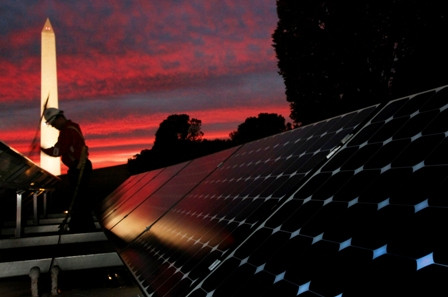Earth Day 2014: Tips on Becoming More Environmentally Friendly

Earth Day 2014 marks the 44<sup>th anniversary of the annual event and will see over a billion people worldwide celebrating the day of action.
This year's Earth Day focuses on green cities to highlight the impact of more and more people migrating to cities to live.
"With smart investments in sustainable technology, forward-thinking public policy, and an educated and active public, we can transform our cities and forge a sustainable future," event organisers said. "Nothing is more powerful than the collective action of a billion people."
To mark Earth Day 2014, IBTimes UK looks at some of the ways people can save energy, become more efficient and environmentally friendly.
Saving Energy
Taking public transport, cycling or using a car pool for just two days out of the week for the commute to work can reduce greenhouse gas emissions by about 1,600 pounds per year. Similarly, by saving up car journeys for shopping trips and errands, and doing them all in one go, will help reduce air pollution and traffic congestion, and save money.
Check how energy efficient you are by looking into how much of your power comes from renewable sources, such as wind or solar energy. Using green power – if optional – will help to reduce greenhouse emissions as well as protect against future costs of fossil fuel scarcity.
Completing an energy audit of your home to work out where you can save money will have a big impact on the environment and your wallet. This can be through simple changes, such as replacing conventional light bulbs with energy efficient ones, or through installing your own green power sources such as solar panels.
Water efficiency
There are a number of ways people can use water more efficiently. The planet only has a small amount of water available for human consumption, so using this resource sensibly is paramount.
- Don't pre-rinse dishes before loading them into a dishwasher – tests showed it does not improve cleaning and you will save about 20 gallons per load. If your dishwasher is inefficient, buy a new one that saves water – it will be worth it in the long-term.
- Shower instead of bath – a five minutes shower will save up to 25 gallons of water in comparison to running a full bath.
- Installing a water-efficient showerhead will also save water and money.
- Fix leaks from faucets as this will mean you use less water and save thousands of gallons each year. To test if you have leaks, you can check the metre before and after a period of a few hours while no water is being used. If the meter has changed, there is likely a leak somewhere.
- Only use the washing machine when you have a full load and if the machine is inefficient, buy a new one. Newer models use just 28 gallons compared with older machines that use up to 41.
Recycle
Recycling around the home can be done in a number of ways – instead of throwing out garden waste, create a compost heap for natural disposal. Food waste from the kitchen can also be added to the heap to break down naturally, meaning you can also save money on fertilisers.
Reusing plastic bags from the supermarket or shops can help to save the environment and reduce costs for companies. In several European countries lawmakers have introduced environmental legislation that means many retailers now charge for shopping bags, so getting into the habit before the law is rolled out further will also save people money.
Thinking about the environment before booking a holiday can also help reduce your carbon footprint and potentially your costs. Considering a staycation or travelling a shorter distance can help to save the environment – think about getting the tent out of the garage for your next trip away.
© Copyright IBTimes 2025. All rights reserved.






















